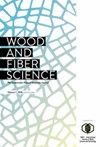CASE STUDY OF 3-PLY COMMERCIAL SOUTHERN PINE CLT MECHANICAL PROPERTIES AND DESIGN VALUES
IF 0.8
4区 工程技术
Q3 FORESTRY
引用次数: 0
Abstract
. This work elucidates on a case study of industrially manufactured cross-laminated timber (CLT). Two methods are used to calculate specimens section modulus: S gross and S effective . The fi rst assumes that specimens behave as a continuous material, whereas the second considers the cross laminations (shear analogy method). Although the shear analogy method is indicated for construction purposes, applications, such as trench shoring, matting, and work platforms, could bene fi t from a simpler calculation method. Therefore, the objective of this work was to conduct a case study of Modulus of Rupture (MOR) and Modulus of Elasticity (MOE) of southern pine CLT to compare the previously mentioned calculation methods. Both parametric and nonparametric fi fth percentiles and associated F b values are reported and were substantially higher than those of the constituent lumber. For MOE, empirical testing and calculation based on gross moment of inertia provided lower values as compared with the constituent lumber.三层商用南松CLT力学性能及设计价值的实例研究
本文阐述了工业生产的交叉层压木材(CLT)的案例研究。计算试件截面模量有两种方法:S总模量和S有效模量。第一种假设试样表现为连续材料,而第二种则考虑交叉叠层(剪切类比法)。尽管剪切模拟法用于施工目的,但沟槽支撑、垫木和工作平台等应用可以从更简单的计算方法中受益。因此,本工作的目的是对南方松CLT的断裂模量(MOR)和弹性模量(MOE)进行案例研究,以比较前面提到的计算方法。报告了参数和非参数第六个百分位数以及相关的Fb值,这些值明显高于组成木材的值。对于MOE,与成分木材相比,基于总惯性矩的经验测试和计算提供了更低的值。
本文章由计算机程序翻译,如有差异,请以英文原文为准。
求助全文
约1分钟内获得全文
求助全文
来源期刊

Wood and Fiber Science
工程技术-材料科学:纺织
CiteScore
7.50
自引率
0.00%
发文量
23
审稿时长
>12 weeks
期刊介绍:
W&FS SCIENTIFIC ARTICLES INCLUDE THESE TOPIC AREAS:
-Wood and Lignocellulosic Materials-
Biomaterials-
Timber Structures and Engineering-
Biology-
Nano-technology-
Natural Fiber Composites-
Timber Treatment and Harvesting-
Botany-
Mycology-
Adhesives and Bioresins-
Business Management and Marketing-
Operations Research.
SWST members have access to all full-text electronic versions of current and past Wood and Fiber Science issues.
 求助内容:
求助内容: 应助结果提醒方式:
应助结果提醒方式:


